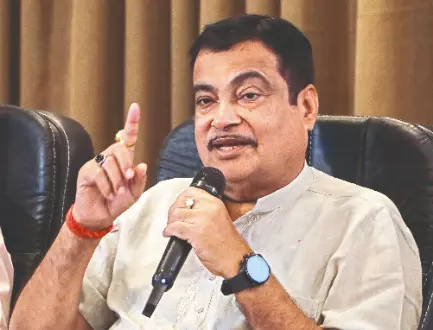Gadkari unveiles ambitious plan for next-gen mass mobility

Ranchi: Union Minister Nitin Gadkari has unveiled an ambitious roadmap for next-generation mass mobility in the country, which includes electric rapid transport, hyperloop in urban areas and ropeways, cable buses and funicular railways in inaccessible terrains.
The Union Minister of Road Transport and Highways said India’s transport sector is undergoing a major transition, with initiatives like tree bank, mobile-based driving tests, and flex-fuel engines by 11 leading automakers in the pipeline.
Also on the agenda are plans to upgrade 25,000 km of two-lane highways to four lanes, establish an electric mass rapid transport network across major routes and scale up road construction to 100 km per day.
“We are driving innovation. A revolution in mass mobility is underway,” Gadkari said.
“Work is progressing at a war footing to transform how India travels, with a focus not just on metropolises but also on remote, inaccessible rural areas. We’re building ropeways, cable cars and funicular railways across 360 locations, including Kedarnath. Work has already started on 60 of these projects,” he said. Funicular railways are a system that combines elevator and railway technologies to efficiently transport people and goods up and down inclines. These are particularly useful in mountainous or hilly areas. Gadkari said the cost of these projects ranges from Rs 200 crore to Rs 5,000 crore and once completed, they will change the face of India.
The minister added that improved road infrastructure will not only boost the economy but will also help in propelling growth and creating jobs.
“I am more than confident that in a year’s time, our highways will match the standard and quality of US roads that I have been emphasising,” he said, adding that days are not far off when metropolises will have cable-run buses, electric rapid mass transport buses with aeroplane-like facilities.
Gadkari said pilot projects like Metrino pod taxis, hyperloop systems, and pillar-based mass rapid transport are in the pipeline for cities like Delhi and Bengaluru. “Technology and investors are both coming in. It will be a revolution,” he said.
The minister said, “Eleven companies, including Tata, Toyota, Hyundai and Mahindra, have agreed to build flex-fuel engine vehicles that will reduce dependence on fuel imports as well as fossil fuel.”
Flex-fuel vehicles are equipped with internal combustion engines that can operate on more than one fuel. They are primarily meant to run on ethanol and methanol or a blend of biofuels and on conventional fuels such as petrol or diesel. Gadkari said India is working on 25,000 km of road upgrades for converting two-lane roads into four-lanes and “we plan to build 100 km of roads per day – this is our target, not a declaration,” he clarified. The length of national highways was 91,287 km in 2013-14 and there has been an increase of about 60 per cent in the length of NHs to 1,46,204 km, he said.



